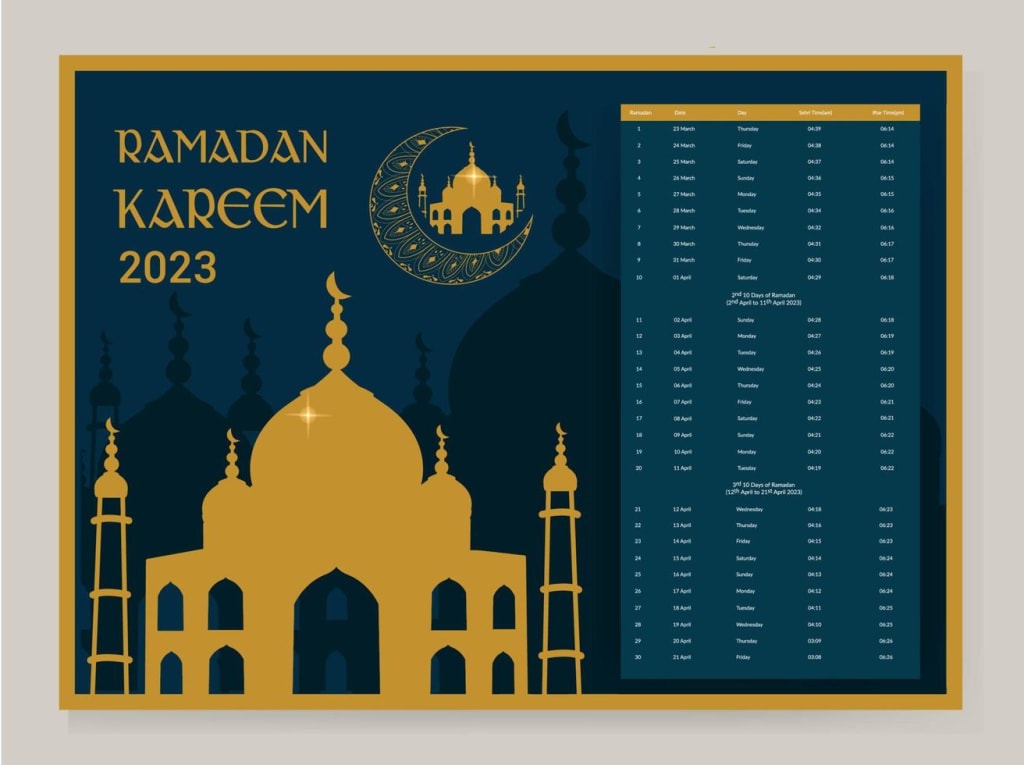Ramadan Calendar 2023: Dates, Significance, and Celebration
Ramadan Calendar 2023 - Qiratul Quran

Ramadan is an important and holy month in the Islamic calendar, observed by Muslims worldwide. This year, Ramadan is expected to begin on the evening of April 2, 2023, and end on the evening of May 1, 2023. In this article, we will explore the significance of Ramadan, the observances associated with it, and how Muslims around the world celebrate this holy month.
What is Ramadan?
Ramadan is the ninth month of the Islamic calendar, which follows a lunar cycle. It is a time of reflection, devotion, and self-discipline. Muslims fast from dawn until sunset every day during Ramadan, abstaining from food, drink, and other physical needs. The purpose of this fast is to gain greater self-awareness, empathy, and spiritual enlightenment.
When does Ramadan start and end in 2023?
Ramadan is expected to begin on the evening of April 2, 2023, and end on the evening of May 1, 2023. The exact dates of Ramadan can vary from year to year, depending on the sighting of the crescent moon. The start and end of Ramadan are determined by the Islamic lunar calendar and the sighting of the new moon.
What are the observances of Ramadan?
Fasting is the most important observance during Ramadan. Muslims fast from dawn until sunset every day during this month. They also refrain from consuming food, drinking, smoking, and engaging in sexual activity during fasting hours. The fast is broken at sunset with an evening meal called iftar. Muslims also wake up early for a pre-dawn meal called suhoor, which is eaten before the start of the fast.
In addition to fasting, Muslims also engage in prayer, charity, and Reading the Quran during Ramadan. They spend time reflecting on their lives, seeking forgiveness, and strengthening their relationship with Allah. Many Muslims also perform the nightly Taraweeh prayers in mosques or at home.
How do Muslims celebrate Ramadan?
Ramadan is a time of communal celebration for Muslims. Families and friends come together to break their fast and share meals during iftar. Mosques hold nightly Taraweeh prayers, which are attended by large congregations. Many Muslims also perform acts of charity and donate to those in need during Ramadan.
The significance of Ramadan
Ramadan is a time of spiritual renewal and reconnection with Allah. It is a time for Muslims to reflect on their lives, seek forgiveness, and strengthen their relationship with Allah. Fasting during Ramadan teaches Muslims self-discipline, empathy, and self-control. It is a time for Muslims to focus on their spiritual growth and develop greater compassion for others.
Tips for fasting during Ramadan
Fasting during Ramadan can be challenging, especially for those who are new to the practice. Here are some tips for fasting during Ramadan:
- Start preparing for Ramadan a few weeks in advance by gradually reducing your intake of food and drink.
- Eat a balanced meal during suhoor to help you feel full and energized throughout the day.
- Stay hydrated by drinking plenty of water during non-fasting hours.
- Avoid overeating during iftar, as this can cause digestive problems.
- Take it easy and avoid strenuous physical activity during fasting hours.
Conclusion
Ramadan is a holy month of spiritual renewal and reflection for Muslims around the world. It is a time for fasting, prayer, and acts of charity. Fasting during Ramadan teaches Muslims self-discipline, empathy, and compassion. It is a time for Muslims to focus on their spiritual growth and strengthen their relationship with Allah.
FAQs
Can I take medication during Ramadan?
Yes, you can take medication during Ramadan.
Is it mandatory for all Muslims to fast during Ramadan?
Fasting during Ramadan is mandatory for all adult Muslims who are physically and mentally able to fast. However, there are exceptions for individuals who are sick, pregnant, breastfeeding, or traveling.
Can I break my fast if I am feeling unwell or weak?
Yes, you can break your fast if you are feeling unwell or weak. It is important to prioritize your health and wellbeing during Ramadan.
Can I make up missed fasts from previous years during Ramadan?
Yes, Muslims who have missed fasts from previous years can make them up during Ramadan.
Is Ramadan only observed by Muslims?
Yes, Ramadan is a Muslim observance. However, people from other faiths and backgrounds are often invited to join in the festivities and experience the community spirit of the holy month.
About the Creator
Qiratul Quran
Qiratul Quran is the leading Online Quran Academy for those who want to learn Islam and the Quran online through distance courses. We have developed an extensive curriculum for learning Quran and basic Islamic education.






Comments
There are no comments for this story
Be the first to respond and start the conversation.